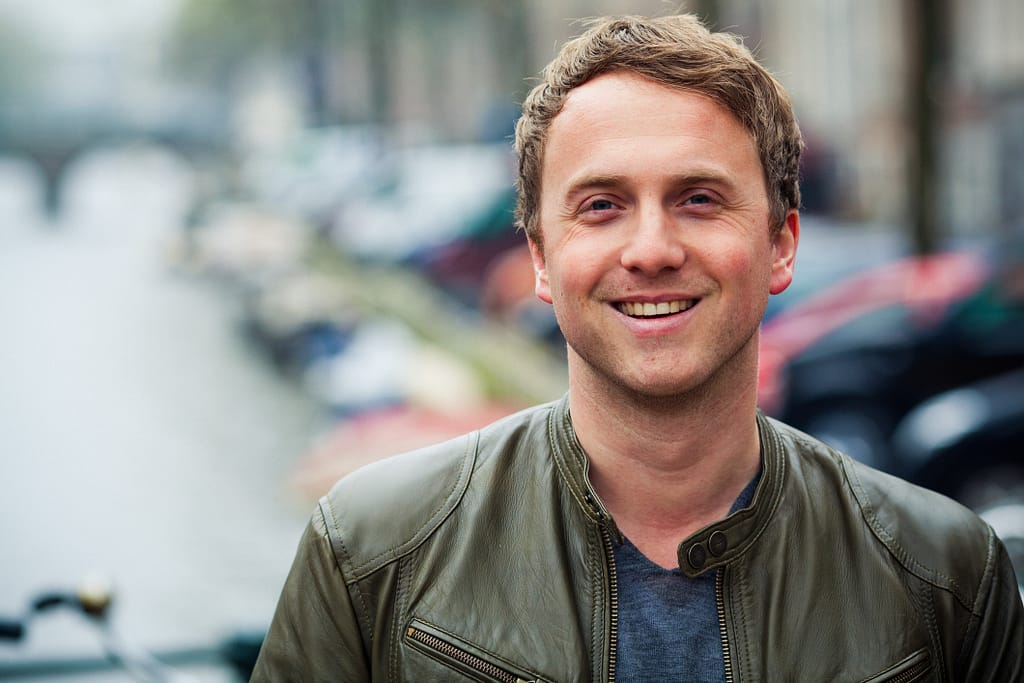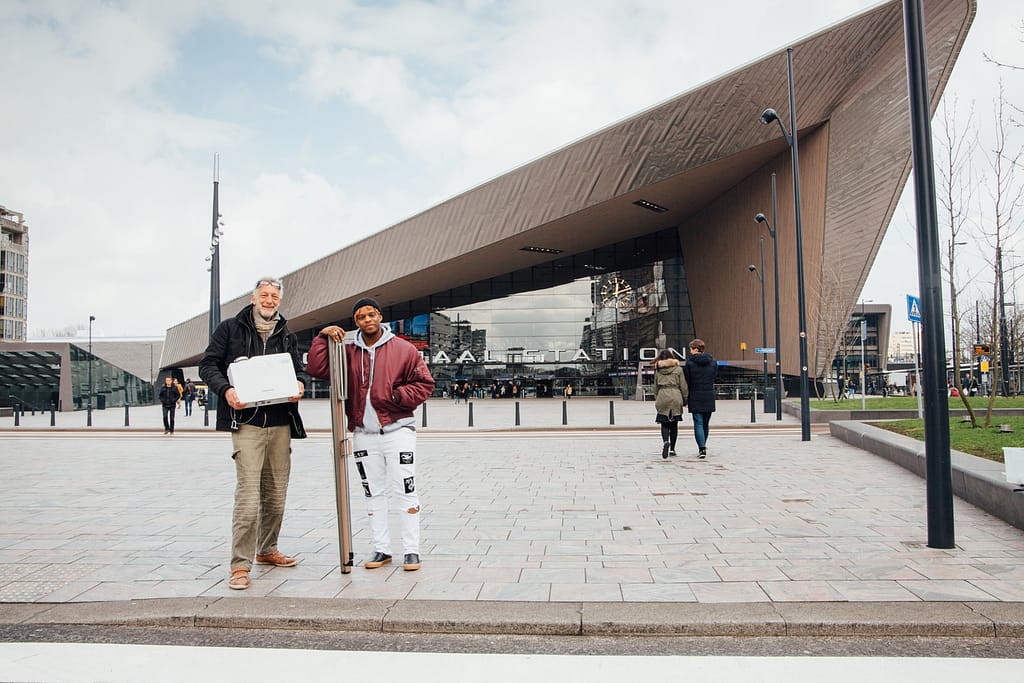An interview with the founder of Peerby provides insight into how the organization became the biggest peer-to-peer product sharing platform in the Netherlands and how that fits into a circular economy.
Peerby provides people the option to rent rather than buy, while feeling more connected to their surrounding communities. They do this by offering anyone the chance to lend or rent products that aren’t often used, to and from their neighbors. A peer-to-peer service platform needs a large population of users for this to work. Founder Daan Weddepohl explains how they hacked a business model for Peerby which provides them with the necessary scale to result in a large positive impact. He talks about how peer-to-peer models are part of an ecosystem that accelerates a circular economy, the effects of COVID-19 on Peerby, and shares his vision on market shifts that hinder or stimulate fewer, better products with extended lifecycles.
Metabolic: Why did you start Peerby?
Daan Weddepohl: “In reality, it’s many things that came together and in the end that’s what creates a new idea. The short version of the story is that in 2009, there was a fire in my house, and I lost my house and all my stuff. I also lost my job and the car that came with it. So in a very short amount of time, I’d lost a lot of the things that I thought defined me. I had no choice than to learn how to live without all these things – without the job title, the house, and the car. I found out that actually letting go of it all was creating a much better life for me. It forced me to become more interdependent and realise that actually it’s a great way to build better relationships with the people around you.
And I also started to realise how much money we spend on things we hardly ever use. As I was rebuilding my life, I realised that there was probably 5000 euros worth of stuff that I had bought over the years and that I was using about 3% of the capacity of those things. For the rest of the time these products were just sitting in cupboards, sheds and attics collecting dust. So I figured if we all find out how to be a little more interdependent, we can actually have access to much more and do more while wasting less. In the end, I think it’s much nicer to be defined by the people around you than by the things that you own.”

M: What are the most popular products that people want to share?
DW: “Basically it’s products that are a pain to own. That can be because they’re very expensive and you hardly ever use them, they take a lot of space to store or they’re complicated to maintain. And there’s lots of products that fall into these categories. There’s all kinds of tools that lie around doing nothing most of the time. A lot of party gear you use to celebrate one or two birthdays per year, like tables and glasses and all that kind of stuff. And all kinds of electronics, like projectors, cameras, garden equipment, pressure washers, cargo bikes etc. It’s really very diverse.”
M: What does the general response tend to be when you tell people about Peerby?
DW: “Well, there’s this interesting psychological bias where you always believe that other people are more selfish than you are yourself. So a lot of people have said that nobody would want to lend their stuff. And what we’ve seen is that quite the opposite is true. Most people don’t mind lending their stuff. And I think a lot of people get it when they hear about the platform, they start talking about all the stuff they own that they hardly ever use. So on a conceptual level people do get it.”
M: What has been the best moment while establishing Peerby?
DW: “The first great moment was when we actually got it to work. What’s interesting about it, is that the idea is extremely simple but getting it to work actually is a huge challenge. Many organisations around the world have tried to create successful peer-to-peer product sharing platforms with no luck. One of the biggest obstacles is being able to connect the people that need something with people that have something – at scale. And we were probably the first ones globally to find a way to create those matches and really get it off the ground. So when we had the first match that was an amazing moment. It was great to see our first two people connected.”
M: How were you able to create the necessary scale for a peer-to-peer platform to work?
DW: “We hacked the challenge by turning around the way most marketplaces work. So most marketplaces start with listings: people list what they own and then others can buy that. For a web platform like this to get off the ground, that way of doing it is a challenging way to get started. We decided that we would start from the demand side. People could post requests and we would then send those requests to everybody that had signed up in their neighborhood. Everybody then became a potential lender and there’s often hundreds of things in everybody’s house that they could potentially lend. First someone has to ask the question, and then you suddenly realise, yeah I can help them out. So that was the initial trick.”

M: How does your service contribute to the circular economy?
DW: “Right now we’re forming what I like to call ‘a minimal viable ecosystem’. In a way we have created the smallest possible circle that we could in a circular economy form. By sharing something, that’s increasing the usage and reducing the amount of products we need as a society. We would also love to start connecting the products on our platform to people that can repair them. We’ve been talking to repair cafes to see whether there might be a link there.
Like organizations such as Firmhouse, we’re also trying to see whether we can create business models for manufacturers where they can start designing products that are meant for sharing. This would create great incentives for manufacturers to create very different products. If they get paid per use, they can start developing products that are designed for communities that are easy to repair that will last for, you know, decades instead of three years. It will make a lot of sense for them to do that because the better their products are, the more they’ll earn.”
M: What do you think could be done to accelerate the circular economy?
DW: “I think developing an ecosystem is quite complicated. It’s a complex puzzle, you need to scale up every piece of the puzzle bit by bit so the ecosystem as a whole can grow, and connections and partnerships can come into existence. The one thing that would be a massive game-changer is if there would be a change in the way governments subsidize the linear economy. At the moment resource usage is pretty much free while labor is taxed heavily.
There’s no real financial reward yet for a circular economy because the linear economy is incentivized. Basically repairing goods is heavily punished by labor taxes. Whereas if you order something from, say, China, the processing is polluting, the diesel boats for transportation are polluting, it’s shipped across the world and then thrown out soon after, and you’re not paying for that in any way. But if you decided to buy a good product, where you know a lot of labor and love went into it, and then decide to have it repaired and maintained for a long time, you’re basically financially punished. So in reality our current free market isn’t very free at all, it’s promoting wasting resources and not repairing or maintaining a product with a long lifecycle.”
M: What effect has the current COVID crisis had on Peerby?
DW: “Firstly, the demand for party gear has collapsed. But that has been fully compensated by massive demand for DIY (Do It Yourself) kinds of tools. We try to keep an eye on whether it’s safe for people to exchange items and follow the government guidelines. Unexpectedly we’ve actually seen a lot of growth during this crisis, probably also because people are more aware of how much they spend. And financially it can make a huge difference. If you do the math, then you could either spend 5000 euros to buy all those things that you don’t really need or pay 3 euros a month and have access to all of that. So there’s a big financial benefit.”
M: What have you learned from this period and how will peer-to-peer sharing move forward?
DW: “We’ve always had a hunch that either once there’s an economic crisis, or people become more aware and consume less, or the global supply chains start to run out of resources, that this model would gain more traction. And I think the recent developments have shown that that is probably true. So, in a way it’s just strengthened our vision.
And what’s also nice, is that in these times a lot of people realise that in their local environment there are people that live nearby who are a source they can connect with, instead of connecting to a faraway country that ships cheap, low-quality items. They can now connect to each other and probably feel better about it too.”
M: Do you know how much impact you’re having?
DW: “Yes, we’re measuring it, but they are still estimates. For example, for 2019 we estimate that we’ve prevented all kinds of negative ecological impacts. So we’ve saved about 5 million litres of water use, prevented over 400,000 kilogrammes of carbon emissions, reduced the need for over 80,000 kilogrammes of natural resources, and prevented over 66,000 kilogrammes of waste. And that’s growing quite rapidly.
This is all based on the impact of an average product. Our products are so diverse, we use a vacuum cleaner as an average because it’s somewhere in the middle between an RV and a hammer. We would love to have more lifecycle analysis data available. We are looking into collecting much more data on the lifetime of products and making that publicly available so that people can start making better decisions on what they buy based on data. And we’ve created a lot of social capital too. So the people are developing ties in their neighbourhood, and that’s good for feeling of safety, health and happiness. So it’s really about improving lives too.”
Find out about Metabolic’s work in manufacturing, innovating for circular products and sustainable supply chains.






